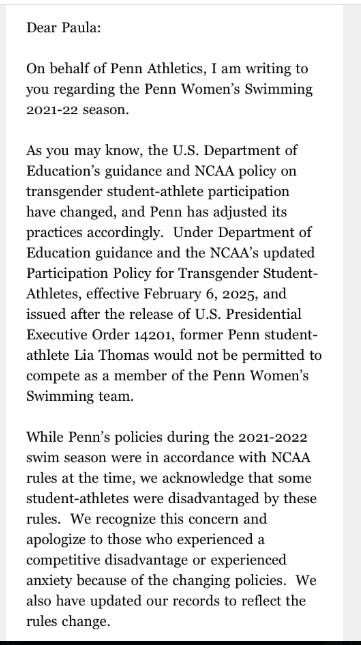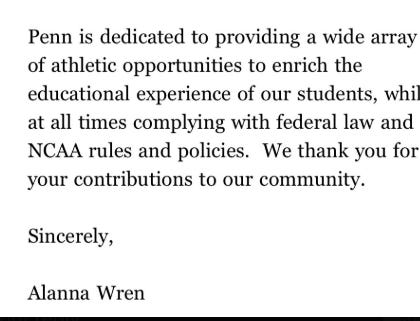The Department of Education's Power is Worth $175M. Women's Sports is Worth Nothing
You’ll pardon me if I, like Paula Scanlan to whom this insult was addressed, am not limp with slavering gratitude to the University of Pennsylvania for this emailed excuse for violating female athletes’ their Title IX rights to sex-segregated sports, enabling daily sexual abuse by forcing them to undress with a fully intact male, and threatening them if they dared to speak up about these hate crimes. They were just following the rules. Even by their own pathetic admission, they knowingly, happily followed “the policies” that allowed women to be “disadvantaged” (read: cheated). Because they could. This in itself is an astounding admission. No acknowledgement that they had humiliated the “student-athletes” (aka, women) knowingly and repeatedly. No acknowledgement of violation of basic human rights. No acknowledgement of sexual abuse. Somehow, this legal mewling doesn’t cover it. Women are not all good now, and it’s profoundly depressing that both the Department of Education and U Penn are convinced a political pat on the head will satisfy women while they both get on with more important things—doing deals.
If anything, this exchange confirms what we all suspected—women or women’s rights or doing the right thing were never a consideration for UPenn, neither when they allowed Will Thomas to compete and undress with the women’s team nor when they banned males. It was always about money. The Department of Education held up $175M, UPenn wanted it, and did what they had to to get it. Women’s sports were and, as is painfully obvious, still are merely collateral. A bargaining chip. There is no way this ugly transaction can be seen as anything but a continuation of the abuse of women.
CNN, like nearly all mainstream media outlets, characterized this as a “battle over $175 million in frozen federal funding,” the Department of Education seeking to reify their power by forcing UPenn to comply (that it was a law enshrining women’s sex-based rights was irrelevant; exerting political might was the goal), and UPenn doing the bare minimum to get their mitts on the clams. UPenn president made no attempt to appear anything other than money grubbing, as CNN reported: “Jameson acknowledged the deal with the administration was made because ‘if unresolved, (the investigation) could have had significant and lasting implications for the University of Pennsylvania.’” Implications being weaselspeak for I kiss my sweet stock options goodbye.
As their non-apology makes clear, UPenn is not guided by any moral compass. They acknowledge no wrongdoing. They see nothing wrong with forcing women to compete with a man, get naked with a man, and threatening them to stay silent about it. They are not sorry for that. They were following the rules, and now the rules have changed. It’s eminently clear that UPenn would allow the exact same crime in a heartbeat if, for example, a new administration pingponged gender identity back into “the rules.” This does not build confidence.
The DOE is not exactly heroic either. While it’s lovely that they followed up the executive orders with a hefty financial stick, where were they in 2007 when the Washington Interscholastic Athletic Association established the first policy that allowed males to self-ID into female sports? Where were they when the NCAA similarly erased the women’s category by allowing men into it in 2010? Where was the fervor for enforcing Title IX’s sex-based protections when the Biden administration pencilled “gender identity” into Title IX, thereby weaponizing it against women? Missing in action, that’s where. Not a peep from the Department of Education while every state in the country openly flouted the spirit and the letter of Title IX by tactilty or explicitly allowing males in female sports. It was not politically expedient to enforce that federal law, so for almost 20 years, the DOE sat on their thumbs and allowed rampant, flagrant violation of women’s rights. Even when they had the justification of a federal law behind them, they refused to enforce it. Where is the apology from the DOE for allowing this violation to happen for nearly two decades? Women have no friend in the DOE. They, too, like UPenn, like the NCAA, are guided by ever shifting political winds.
It cost UPenn nothing to accept the biological meaning of male and female, to ban males from female sports, to erase Thomas’s records and award them to the women who won them, to send out those insulting non-apologies to women they violated in the most egregious way. Their wealthy “progressive” donors will understand that they had to appear to comply because everyone in the donor class knows it’s about money. The donors would have done the same thing. Have done the same thing. In three-and-a-half years, there will be a new administration, new policies, new deals to be done.
Mission accomplished for the Department of Education. They prevailed over UPenn, and expect to hear no more from women. Come the next administration, the DOE will be making new deals that may or may not have to do with women’s sports. Obviously, if they could be convinced to ignore gross Title IX abuses for 18 years, protecting women’s sports is not high on the list of the DOE’s priorities.
If we’ve learned anything from this smarmy transaction, it’s that, in practical application, women’s sports is not a right. It’s a bargaining chip. Even the existence of a federal law enshrining women’s sex-based rights is no guarantee of protection.
For solution, and this too is proving to be less than 100% effective, I point to the UK whose Supreme Court ruled on April 16, 2025 that the terms “man,” “woman,” and “sex” in their Equality Act refers to biological sex. This means that even men with a Gender Recognition Certificate (of their feminine identity) can be excluded from women’s spaces and sports. It seemed crystal clear, and most UK sports organizations updated their policies (if they had not already) to comply with the law that women’s sports was for those born female, and yet, and yet, problems have arisen. Across the pond as here, despite federal laws and high court decisions that could not be more straightforward and seemingly easy to enforce (we’ve been doing it for centuries), some organizations are dragging their feet, making excuses, “seeking clarification.” It seems to have something to do with not valuing women and women’s rights and women’s boundaries as highly as men’s feelings and desires. And that is what UPenn articulated perfectly in their non-apology—how very little women’s sports is worth to them.




Why Institutional Support for Male Inclusion in Women’s Sports Remains So Entrenched—And What We Can Do About It
Despite a wave of public disillusionment and the Trump administration’s attempt to reassert sex-based Title IX protections, institutional support for allowing males to compete in female-only sports remains widespread—and, if anything, more defiant. There’s an almost reflexive determination among universities, athletic organizations, and elite media to resist what they characterize as a “rollback” of civil rights, even when the issue at hand is the preservation of hard-won women’s sports.
This support is not simply lingering confusion or benign overreach. It is the product of deliberate ideological capture. The idea that gender identity must override biological sex has become dogma among sports administrators, school officials, professional leagues, gear manufacturers, DEI offices, and journalists. Those in authority not only comply with inclusion policies—they actively promote them, often citing diversity goals or anti-discrimination commitments without grappling with the physical and psychological harms to female athletes.
The result is a dystopian inversion of fairness. Young women are forced to share locker rooms and compete against male-bodied athletes, and when they speak up, they are punished or ignored. Institutions like UPenn are more concerned with federal grants than the rights or safety of their athletes, and the Department of Education’s years-long failure to enforce Title IX in the face of these violations has sent a chilling message: women’s sports are negotiable.
So where does this leave us?
Remedies Must Match the Depth of the Institutional Capture
Legal Accountability
Continued litigation is essential. Lawsuits that assert the sex-based intent of Title IX—and challenge the reinterpretation of “sex” to mean “gender identity”—must be widely supported and publicized. Courts remain one of the last venues where arguments grounded in reality can still gain traction.
Donor and Alumni Pressure
Alumni, especially those from women's programs, should make their financial support contingent on restoring sex-based fairness. Organized alumni pledges to withhold donations until schools abandon male inclusion policies can influence risk-averse administrations.
Parallel Institutions
If major governing bodies remain captured, new leagues, tournaments, or governing associations may need to be built from the ground up—ones that restore eligibility rules grounded in sex, not identity. These may start small but offer a meaningful refuge for female athletes who want a fair playing field.
Peaceful Civil Disobedience (With Legal Safeguards)
Civil disobedience has a proud tradition in American reform movements, but it must be done wisely and lawfully. Examples that have been cleared by qualified legal counsel in relevant jurisdictions include:
Athlete walkouts: Coordinated withdrawals from competitions when male athletes are entered in women’s events.
Refusal to undress or use locker rooms with males: This is legally protected in many states under privacy or dignity statutes. Athletes can respectfully but firmly assert their rights and document their actions.
Silent protest gestures: Such as turning backs during ceremonies or holding up signs during media events—acts that are constitutionally protected speech in public schools and public universities.
Opting out of university branding: Teams refusing to wear university logos if their athletic department enforces sex-denying policies.
Title IX complaint filing campaigns: Encourage mass filing of federal Title IX complaints to overload the administrative process and force public reckoning.
All of these require advance planning and coordination with legal experts. The goal is to apply moral and political pressure without triggering criminal charges or school expulsion.
Public Education and Naming the Problem
Continue naming the issue clearly and accurately. This is not about “inclusion.” It is about male participation in female-only sports. Euphemisms obscure the harms and silence dissent. Effective communication—especially from mothers, former athletes, and coaches—is essential to reach the broader public and recenter the conversation on fairness and sex-based rights.
Legislative Action
At the state level, pressure legislators to clarify the legal definition of "sex" in education and sports law. States like Kansas, Texas, and North Carolina have begun passing such laws. These efforts must be expanded and defended in court when challenged.
In sum, the institutions that claim to care about fairness and opportunity for women have shown they will only act when compelled. Whether by legal defeat, donor revolt, public protest, or moral clarity, that pressure must now come from those willing to tell the truth—and act on it.
Another excellent article Sarah! I'm tired of saying "well this is a good first step." I'm tired of being patient. I'm tired of watching coverage of these events as wrongs being righted. In the end, sports NGBs for the most part are giving the middle finger to the Administration and women. Even the IOC with a woman President are dragging their feet. Does anyone else feel that if there is a change in the Administration in 2028 or even in Congress in 2026 we will be back to men firmly participating in women's sports at all levels?